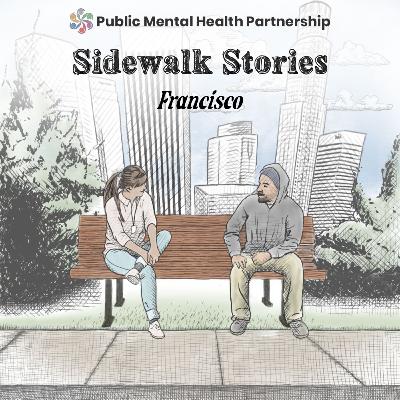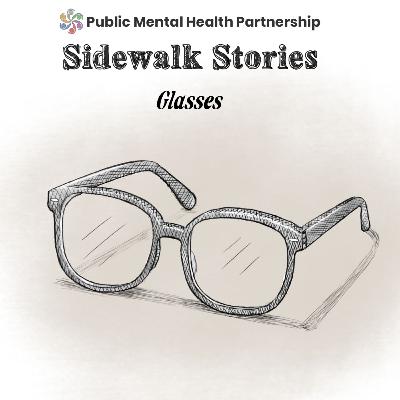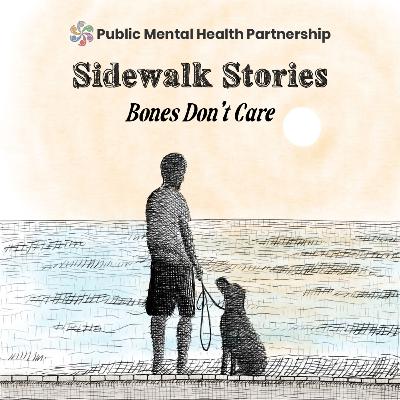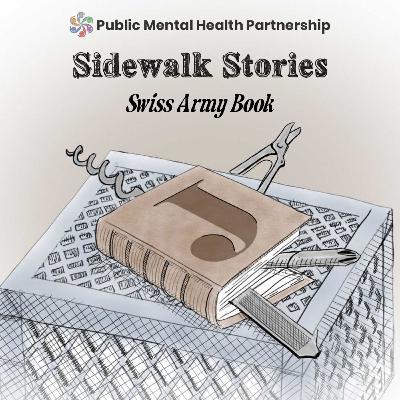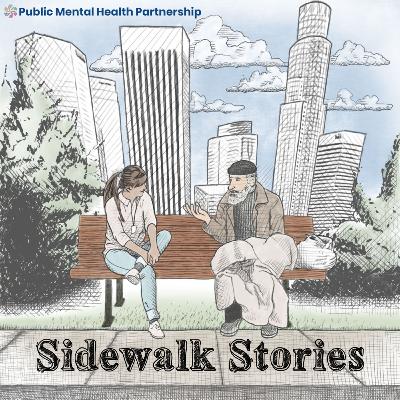Discover UCLA Public Mental Health Partnership
UCLA Public Mental Health Partnership

UCLA Public Mental Health Partnership
Author: PMHP
Subscribed: 6Played: 69Subscribe
Share
© PMHP
Description
Our mission: In partnership with the Los Angeles County Department of Mental Health, the Public Mental Health Partnership at UCLA aims to realize a vision for excellence in care for vulnerable populations that incorporates typically marginalized perspectives and builds capacity to foster health equity.
Visit our website for more information: pmhp.ucla.edu
Visit our website for more information: pmhp.ucla.edu
202 Episodes
Reverse
Written by Kimberly Barrante; Narrated by Jonathan C. Fernandez; Artwork by Adrian Cruz; Produced by DMH + UCLA Public Mental Health PartnershipSidewalk Stories is inspired by real-life relationships between an unhoused person and their mental health outreach provider on the Los Angeles County Homeless Outreach and Mobile Engagement team, known as HOME. Though identifying details have been changed, the heart of these stories remains intact. Their work is a beautiful reminder that by offering a helping hand, a listening ear, and leading with empathy, we can inspire hope and help others know that they are never alone.
Written by Taylor Crawford; Narrated by Stephanie Y. Cole; Artwork by Adrian Cruz; Produced by DMH + UCLA Public Mental Health PartnershipSidewalk Stories is inspired by real-life relationships between an unhoused person and their mental health outreach provider on the Los Angeles County Homeless Outreach and Mobile Engagement team, known as HOME. Though identifying details have been changed, the heart of these stories remains intact. Their work is a beautiful reminder that by offering a helping hand, a listening ear, and leading with empathy, we can inspire hope and help others know that they are never alone.
Warning: This episode includes discussion of suicide. If this topic is triggering for you, please consider skipping this episode. If you or someone you know is in crisis, in the US, please call or text 988 for immediate help. If outside the US, please reach out to your local crisis hotline.Written by Ally Merkel; Narrated by Lydia Berger Gray; Artwork by Adrian Cruz; Produced by DMH + UCLA Public Mental Health PartnershipSidewalk Stories is inspired by real-life relationships between an unhoused person and their mental health outreach provider on the Los Angeles County Homeless Outreach and Mobile Engagement team, known as HOME. Though identifying details have been changed, the heart of these stories remains intact. Their work is a beautiful reminder that by offering a helping hand, a listening ear, and leading with empathy, we can inspire hope and help others know that they are never alone.
Written by Brady Bryson; Narrated by Roni Orlina; Artwork by Adrian Cruz; Produced by DMH + UCLA Public Mental Health PartnershipSidewalk Stories is inspired by real-life relationships between an unhoused person and their mental health outreach provider on the Los Angeles County Homeless Outreach and Mobile Engagement team, known as HOME. Though identifying details have been changed, the heart of these stories remains intact. Their work is a beautiful reminder that by offering a helping hand, a listening ear, and leading with empathy, we can inspire hope and help others know that they are never alone.
Written by Kevin Grossman; Narrated by Amy Selma; Artwork by Adrian Cruz; Produced by DMH + UCLA Public Mental Health PartnershipSidewalk Stories is inspired by real-life relationships between an unhoused person and their mental health outreach provider on the Los Angeles County Homeless Outreach and Mobile Engagement team, known as HOME. Though identifying details have been changed, the heart of these stories remains intact. Their work is a beautiful reminder that by offering a helping hand, a listening ear, and leading with empathy, we can inspire hope and help others know that they are never alone.
Written by Erin Gruodis-Gimbel; Narrated by Roni Orlina; Artwork by Adrian Cruz; Produced by DMH + UCLA Public Mental Health PartnershipSidewalk Stories is inspired by real-life relationships between an unhoused person and their mental health outreach provider on the Los Angeles County Homeless Outreach and Mobile Engagement team, known as HOME. Though identifying details have been changed, the heart of these stories remains intact. Their work is a beautiful reminder that by offering a helping hand, a listening ear, and leading with empathy, we can inspire hope and help others know that they are never alone.
Written by Tavis Vannucci; Narrated by Christian Gray; "Quando me'n vo" aria performed by Caroline Diehl; Artwork by Adrian Cruz; Produced by DMH + UCLA Public Mental Health PartnershipSidewalk Stories is inspired by real-life relationships between an unhoused person and their mental health outreach provider on the Los Angeles County Homeless Outreach and Mobile Engagement team, known as HOME. Though identifying details have been changed, the heart of these stories remains intact. Their work is a beautiful reminder that by offering a helping hand, a listening ear, and leading with empathy, we can inspire hope and help others know that they are never alone.
Written by Ryan Frances-Wright; Narrated by Gervais Weekes; Artwork by Adrian Cruz; Produced by DMH + UCLA Public Mental Health PartnershipSidewalk Stories is inspired by real-life relationships between an unhoused person and their mental health outreach provider on the Los Angeles County Homeless Outreach and Mobile Engagement team, known as HOME. Though identifying details have been changed, the heart of these stories remains intact. Their work is a beautiful reminder that by offering a helping hand, a listening ear, and leading with empathy, we can inspire hope and help others know that they are never alone.
Written by Joseph Mango; Narrated by Dominica Ivey; Artwork by Adrian Cruz; Produced by DMH + UCLA Public Mental Health PartnershipSidewalk Stories is inspired by real-life relationships between an unhoused person and their mental health outreach provider on the Los Angeles County Homeless Outreach and Mobile Engagement team, known as HOME. Though identifying details have been changed, the heart of these stories remains intact. Their work is a beautiful reminder that by offering a helping hand, a listening ear, and leading with empathy, we can inspire hope and help others know that they are never alone.
Written by Zoe Simone; Narrated by Lydia Berger Gray; Artwork by Adrian Cruz; Produced by DMH + UCLA Public Mental Health PartnershipSidewalk Stories is inspired by real-life relationships between an unhoused person and their mental health outreach provider on the Los Angeles County Homeless Outreach and Mobile Engagement team, known as HOME. Though identifying details have been changed, the heart of these stories remains intact. Their work is a beautiful reminder that by offering a helping hand, a listening ear, and leading with empathy, we can inspire hope and help others know that they are never alone.
At PMHP, we're honored to share a new narrative podcast of 10 episodes titled Sidewalk Stories, inspired by real-life relationships between an unhoused person and their mental health outreach provider on the Los Angeles County Homeless Outreach and Mobile Engagement team, known as HOME. Though identifying details have been changed, the heart of these stories remains intact. We aim to shine a light on their tireless work and amplify their voices to raise awareness, break down stigma, and highlight a crisis affecting cities across the country. Their work is a beautiful reminder that by offering a helping hand, a listening ear, and leading with empathy, we can inspire hope and help others know that they are never alone. Visit pmhp.ucla.edu/sidewalkstories
Presented by Ian McLoone, MPS, LPCC, LADCThis practical training explores the critical intersection between attention-deficit/hyperactivity disorder (ADHD) and substance use disorders (SUDs). With approximately 1 in 5 individuals with SUD also experiencing ADHD, understanding this common co-occurrence is essential for effective support. Designed to support behavioral health practitioners across a range of service lines, this introductory training provides practical strategies for identification, engagement, and person-centered support. Participants will gain foundational knowledge about both conditions, explore the neurobiological and psychosocial factors that contribute to their co-occurrence, and learn culturally responsive approaches for supporting clients who may be experiencing both challenges. Attendees will develop skills to recognize potential signs of ADHD in clients with substance use concerns, initiate supportive conversations, and connect clients with appropriate resources within the constraints of their role as unlicensed providers.
Presented by Madina Wardak, MSW, ACSW and Vanessa Porea, LPC, APCC, NCPRSSEffective team-based care is essential for positive outcomes in intensive mental health programs. This training explores the critical role of team climate in reducing burnout, fostering motivation, and improving client outcomes. Participants will learn evidence-based tools to assess team climate and identify areas for growth, in addition to strategies that enhance key dimensions such as psychological safety, task orientation, accountability, and innovation. The training also introduces five core ingredients of high-functioning teams, and uses experiential exercises to explore common team pitfalls and how to foster a shared purpose, strong connection, and sustainable success in community mental health settings.
Presented by Danielle Cameron, LCSW, MSWThe critical time intervention (CTI) model is a time-limited, evidence-based practice that mobilizes support for our communities’ most vulnerable individuals during periods of transition. It facilitates community integration and continuity of care by ensuring that a person has formidable ties to their community and support systems during these critical periods. In this training, participants can expect to learn about the CTI model and develop skills to help clients transition out of intensive clinical programs like Full Service Partnership (FSP). Through case scenarios and discussions, participants will be led in engagement opportunities and activities rooted in CTI to proactively evaluate and plan for client success after intensive community mental health programs.
Presented by Madina Wardak, MSW, ACSWThis presentation explores the observance of Ramadan, highlighting spiritual, cultural, and practical considerations that may affect the needs and engagement of individuals receiving mental health services. Attendees will gain insight into the significance of the holy month, including fasting, prayer, and community obligations, and how these factors influence access to services. The presentation will provide strategies for culturally humble and inclusive support, ensuring that providers effectively meet the needs of clients who observe Ramadan. Community resources will also be provided. This training is intended for field-based mental health and outreach workers in Los Angeles County.
Presented by Maggie Mullen, LCSW
This training will outline the basics of dialectical behavior therapy (DBT), an evidence-based psychotherapy for emotion dysregulation that helps people become more mindful as they simultaneously work on improving interpersonal relationships, tolerating distress, and regulating intense emotions. This presentation will introduce practical applications of DBT through discussion, vignettes, video clips, and opportunities to practice. By examining the four modules of DBT (distress tolerance, emotional regulation, mindfulness, and interpersonal effectiveness), learn how to apply DBT concepts and principles to benefit clients. There will be an emphasis on practical skill-building interventions derived from DBT, rather than on building a full DBT program. The intended audience is any clinician with an interest in DBT.
Presented by Maggie Mullen, LCSW
This training will outline the basics of dialectical behavior therapy (DBT), an evidence-based psychotherapy for emotion dysregulation that helps people become more mindful as they simultaneously work on improving interpersonal relationships, tolerating distress, and regulating intense emotions. This presentation will introduce practical applications of DBT through discussion, vignettes, video clips, and opportunities to practice. By examining the four modules of DBT (distress tolerance, emotional regulation, mindfulness, and interpersonal effectiveness), learn how to apply DBT concepts and principles to benefit clients. There will be an emphasis on practical skill-building interventions derived from DBT, rather than on building a full DBT program. The intended audience is any clinician with an interest in DBT.
Presented by Danielle Cameron & Vanessa Porea.
In this training, providers will gain an understanding of substance use and co-occurring disorders, along with considerations for treatment and resources to refer clients to the appropriate services when needed. Providers will also learn skills and practical tools from cognitive behavioral therapy (CBT), dialectical behavioral therapy (DBT), and motivational interviewing (MI) that can be applied when working with clients who experience these disorders, along with exploring ways providers can engage in their own self-care. This training is intended for field-based mental health and outreach workers in Los Angeles County.
Presented by Danielle Cameron & Vanessa Porea.
In this training, providers will gain an understanding of substance use and co-occurring disorders, along with considerations for treatment and resources to refer clients to the appropriate services when needed. Providers will also learn skills and practical tools from cognitive behavioral therapy (CBT), dialectical behavioral therapy (DBT), and motivational interviewing (MI) that can be applied when working with clients who experience these disorders, along with exploring ways providers can engage in their own self-care. This training is intended for field-based mental health and outreach workers in Los Angeles County.
Presented by Danielle Cameron, LCSWThe majority of behavioral health professionals can expect to face client resistance behaviors at some point in their careers. As commonly referred to in peer-reviewed literature, the term “resistance behaviors” can best be understood as the expression of apprehension and reluctance to engage in services and ambivalence around change, most often seen in cases with clients mandated to treatment. There are several factors that contribute to client resistance behavior and providers will receive a review on understanding, responding to, and processing distressing interactions with clients, especially around client motivation. Concepts from evidence-based frameworks such as motivational interviewing, solution-focused therapy, and trauma informed approaches will be examined to enhance providers’ skill base in working with clients exhibiting resistance behaviors. Additionally, this training will support behavioral health providers in understanding the importance of and how to collaboratively set person-centered goals with clients, especially as it relates to increasing engagement with clients who display resistance behaviors. Lastly, this training will educate attendees on concepts such as burnout, compassion fatigue, transference, and counter-transference to help them normalize and understand common experiences they may encounter when handling challenging dynamics with clients. This training is intended for field-based mental health and outreach workers in Los Angeles County.






